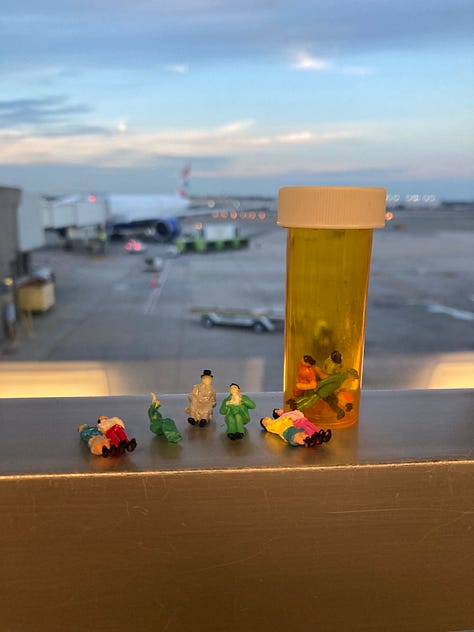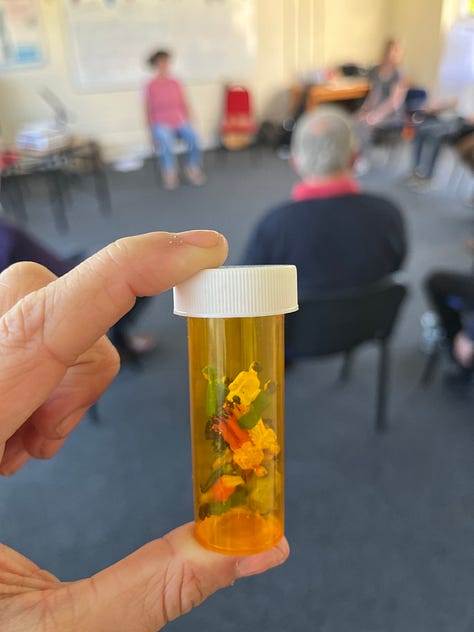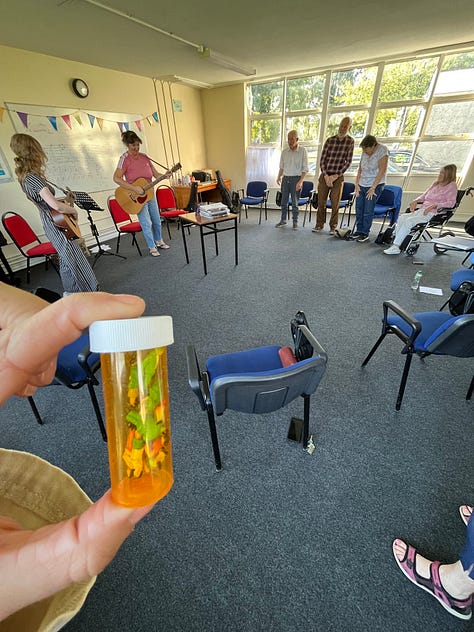The purpose of this newsletter is to catalyze the growing Social Prescribing movement. We’ll share insights from the network, philosophy on advancing the movement, and act as an idea factory of insights. This newsletter is co-created with the visionary leaders shaping this practice nationally.
Events & Invitations
Social Prescribing Community of Practice on Zoom, June 27th, 7:00-8:00pm ET - are you actively implementing or seeking to implement social prescribing? If so, please join us for a collaborative one hour Zoom call with others who have the same goals. 7 people have already signed up! We will share best practices, barriers, and ideas to support each other's work. Email Dan at socialprescribingusa@gmail.com to join.
The 7th Annual UnLonely Film Festival Virtual Launch Event on Sunday, June 4th, 2023 at 7pm ET hosted by the Foundation for Arts and Healing. The event will feature 30 new, powerful short films focused on loneliness from a diversity of perspectives. The event will be hosted by Mike Paseornek, former president of Lionsgate Films. These new films will be available to stream all year long on the website of the Foundation for Art and Healing.
Request for research subjects implementing social prescribing - University of Florida Center for Arts and Medicine is conducting research to understand the scope and impact of Social Prescribing programming in the United States – how programs function, how they are implemented, the barriers and enablers of implementation, and the impact the programs have. Reach out to Morgan Yacoe if you’d like to be included.
Insights & Shout Outs
April NYC Social Prescribing Conference: On April 14th, 60 leaders from 10 different sectors gathered to catalyze social prescribing in New York City. Stay tuned on next steps. Thank you to all the wonderful speakers; the co-hosts of the event Richard Crawford, Dan Morse, Jill Sonke, and Sepi Djavaheri; the students who helped plan the conference including Rachel Chen, Josh Caven, Thea Chung, Cosette Wu, Maddie Maier, Nico Manhas, Yifan Chen, Seher Akram, and Gray Davidson Carroll; and our online hosts Nicole Morgan and Tasha Golden. More soon!
New frameworks for sustainable social prescribing: The California Health Care Foundation (CHCF) has provided a grant for Social Prescribing USA to create a model for sustainable social prescribing. CHCF is supporting Cal-Aim, a 5-year project to re-design Medi-Cal (Medi-Caid in California). It includes funding core Social Determinants, including provisions for the community based organizations. This will be an exciting model to follow and the framework will be shared in a future newsletter.
Harvard Report outlines needs of the US social prescribing movement: This report outlines loads of insights from their design event held in October of 2022. The report speaks to the nuance of how the movement could benefit from both top-down and bottom up organizing, prototyping while ensuring sound fundamentals, and more. Shout out to the co-hosts Mo Sook Park, Reena Shukla, André Nogueira, Jill Sonke, Dan Morse, all the talented designers who facilitated the groups, the students who took notes, attendees, and all who contributed to the report.
Major initiative to nationalize exercise prescriptions: Amy Bantham is leading an alliance of 19 organizations in collaboration with major government agencies to enable exercise prescriptions for all Americans. Check out here their presentation outlining measures, targeted billing codes, interoperability plan, and project status. Go, Amy, go!
Accessibility through language: Holden Arboretum uses inclusive language to make its grounds more accessible. Instead of suggesting attendees go for a "walk," which might be triggering for those who are physically impaired, they use the "exploration" to welcome visitors of all abilities. This inclusive language and accessibility features make the arboretum a welcoming place for all. Thank you for pioneering inclusive work in Cleveland!
Groundbreaking book on Arts + Neuroscience: "Your Brain on Art" explores the science behind the power of art. The authors, Susan Magsamen at Johns Hopkins and Ivy Ross at Google, present a wealth of research that shows how art can boost our cognitive abilities, reduce stress, and even help us heal from injuries. The book is full of practical advice for using art in our lives, and it is a must-read for anyone who wants to learn more about the power of art in health. Thanks for the life changing read, Susan and Ivy!
Learning from Kaiser’s social activity platform: Two years ago, Kaiser launched a platform for their patients to search for social prescriptions including museums, gardening, book clubs, walks, family and religious activities (two minute video summary here). We are curious about the status of the project and any insights and lessons learned from implementation. Reach out if you work at Kaiser!
Sharing best practices across the globe: Cross Fields, a Japanese social enterprise non-profit, had a learning exchange in Northern CA to help support their new Minister of Loneliness. The visit was chock full of meetings with experts like UCSF’s Dr. Carla Perisonotto, and multiple Bay Area nonprofits, including RYSE Youth Center, East Bay Regional Parks, & Contra Costa Health Services. Among many ‘aha’ moments, the idea of nature prescriptions was novel for them and one they wanted to bring it back home.
Tip: Supercharge Implementation
Driving physician and patient behavior change: Behavior change is hard. Especially for overwhelmed clinicians and patients. We need simple ways to make new behaviors stick. One way is to use visual assets. One such graphic, created by Cleveland Clinic Geriatrics Division, Holden Arboretum, and Social Prescribing USA makes the entire social prescribing patient referral process clear; the visual is easier to understand than a simple list of text instructions:
Assets like these can also be used to empower patient engagement. Here is a one pager on volunteerism:
Clinicians can print this out for the patient to take home or link to it in any digital referral platform. The page keeps social prescriptions top of mind, reinforces its health benefits, and provides links for further exploration. The patient may even take the flier home, and share it with a friend or family member who will accompany them along the social prescription.
Visual assets can also be used as an ice-breaker with patients. For example, the "People in a Pill Bottle" below created by journalist Jules Hotz is a vivid and memorable way to bring up the concept of social prescribing.



The bottle on a doctor's desk can also keep social prescribing top of mind as a potential solution for patients. They can grab for it and hold it when describing social prescribing to patients.
Email us at socialprescribingusa@gmail.com if you would like to collaborate on, or request, editable templates of assets. We are drafting some as we speak!
Research & Media
New Surgeon General Advisory Raises Alarm about the Devastating Impact of the Epidemic of Loneliness and Isolation in the U.S.
New industries to benefit from social prescribing?: A new study shows how attending live sporting events improves levels of well-being and reduces feelings of loneliness (survey of 7,209 adults in England). Could the sporting events industry work to drive forward reimbursement and contribute to the social prescribing movement? Time will tell. Shout out to Jill Sonke for the share!
How urban design affects loneliness: a new systematic review outlines how the way we design and plan our cities impacts loneliness. In addition to access to public spaces, the report touches on other causes including housing tenure, reliability of transport, neighborhood affordability and more.
UK invests £3.6 million more into social prescribing for mental health: this article outlines a bunch of quotes on the decision from ministers of Social Care, Women’s Health, Equalities, and Director of Personalized Care for the NHS. Check out their new campaign video to overcome grief and bereavement through social connection.
Resource: dialogue on arts, online: Alessandra Rosenfeld has created a beautiful free online art gallery called pixelle.co that arts prescribers can use as a resource to lead discussion on artwork. Reach out to Alessandra if you’d like to collaborate: arosenfeld7@gmail.com.
Podcast Episode on Social Prescribing movement: Patrick Whitney, of the Harvard D-Lab, hosts Jill Sonke of University of Florida to discuss the social prescribing movement that is gaining momentum in the U.S.
Relational Fitness, a new concept and business: The founders of Soul Cycle have a new social health concept brewing - relational fitness. Their first location, located in NYC, is a place where folks can pay to connect and have deep conversations with others. Will they define a new paid-experience category around connection? Might health systems refer to these gatherings? Time will tell!
Trends in Volunteerism: The report "State of Volunteer Engagement: Insights for Nonprofit Leaders and Funders" provides new insights on the trends in volunteering. The number of volunteers has been declining due to increasing work hours, rising childcare costs, and an aging population. The most common reasons for volunteering have shifted from helping others to personal reasons such as learning new skills, meeting new people, or giving back to the community. The report also highlights the challenges to volunteerism such as lack of time and resources. Shout out to Robert Egger for sharing!
Inspiration: a radically accepting community: In the Belgian town of Geel, families have long taken in people with psychiatric conditions, providing them with a home and support. This approach, known as "Geelse Gasten", has been in place for centuries and is based on the belief that people with mental illness can recover and thrive in a supportive community. While Geel's model of care is unique, it has attracted attention from mental health professionals around the world who are looking for new and innovative ways to treat mental illness. This article explores the history and effectiveness of Geelse Gasten, and discusses the potential for this model to be adopted in other countries. The article can provide inspiration for clinical professionals and community groups working to create a radical sense of belonging, love, and support.
The science and trends of loneliness in America: Interview with UCSF loneliness experts Drs. Mark Pantell and Carla Perisonotto: Is too much alone time making us sick?
Friends keep us healthy: Friends are good for your health. World-renowned psychologist Robin Dunbar shares, “By far the biggest medical surprise of the past decade has been the extraordinary number of studies showing that the single biggest predictor of your psychological and physical health and wellbeing is simply the number and quality of close friendships you have. By comparison, all the traditional factors that your doctor usually worries about on your behalf make only modest contributions.”
Updated resource page at Social Prescribing USA - Check out the U.S. and International resources. Please submit links to other core articles at socialprescribingusa@gmail.com.
Reach out to us if you have anything you’d like included in our next newsletter!
Until next time,
Social Prescribing USA team
socialprescribingusa.com | socialprescribingusa@gmail.com






